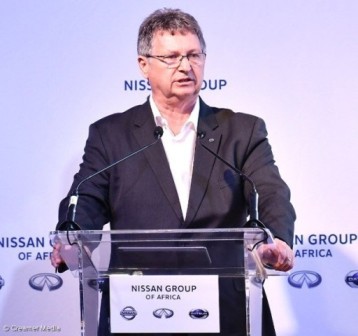… Pursues Replicate of Chinese Economic growth in Africa
Nissan has expressed a resolve to support African countries towards real economic growth in few years. In a recent presentation in South Africa, Mike Whitfield is Managing Director, Nissan Group of Africa, as well as Vice President, Association of African Automotive Manufacturers (AAM), assured that, as continent continues to grow, Nissan is rightly positioned to support African countries, by bringing real mobility solutions to the people – and helping transform their economies.

To this end, Nissan recently announced fresh plans to start building its award-winning Navara one-ton pick-up at its Rosslyn plant in Pretoria- South Africa.
The Rosslyn plant was renowned for producing different vehicles for 60 years but started operating exclusively as a Nissan plant since the 1980s, and very recently, became a light commercial vehicle hub for the production of the Japanese engineered NP300 Hard-body and NP200 pick-ups, which are exported to 45 African markets.
From all indications, the first Nissan Navara models, when they start rolling off the production lines in 2020, will become a major contender in the continental market.
According to the auto maker, in a statement released on Sunday, the vehicle is not only designed for Africa, but made in Africa by Africans and will in the process, increase the competitiveness of the Rosslyn factory and create almost 1,200 new jobs at the plant as well as across the supply chain with an investment of almost US $207-million.
“This achievement,” it stated, “is expected to also transform Nissan’s South Africa supply chain network by developing 13 new black-owned suppliers and setting localised content targets by 60% for the South African-built Navara.
“The decision is the result of a very long and very deep relationship with the South African government on the need for a sustainable and competitive automotive industry, which is being demonstrated through a series of progressive automotive industrial development plans, culminating in the ambitious South African Automotive Master plan 2035.
“This will not only set targets but provides investment security and planning certainty for the next 16 years, while also ensuring that the plant meets world class standards through constant human resources’ appraisal.
“Today, the Rosslyn plant has been declared an anchor factory for Nissan Africa, Middle East and India region.
“Our vision therefore, is to develop manufacturing hubs in other African countries – in addition to our two facilities in Egypt and Nigeria – because we believe that Africa is not just the last frontier for the automotive industry, but a significant catalyst for industrialization and growth.
“The two, of course, go hand in hand; automotive manufacture is an incredible spur to a country’s industrialization, implying that as a country industrialises and diversifies its economy, so its GDP increases and its people become financially sustainable.”
Recalling We have seen this with the so-called Asian Tigers and most recently with China.
Nissan boss, who likened Africa’s present economic state to that of China 20 years ago, when the country experienced a very low level of motorisation and a very low GDP, attributed the growth later recorded in China to an unequivocal determination to create growth, so policies were put in place, just as the Asian Tiger economies, and growth followed suit afterwards.
According to Whitfield, Nissan’s objective is to replicate the Chinese accomplishment by working with African countries that are desirous of creating a sustainable and competitive automotive industry.
“Africa,” he pointed out, “is at the very beginning of this phase and we have partnered with countries which we believe have both the potential for rapid growth and the will to work with us in creating this highly specialised industry.
“We were the first movers in Nigeria and we have signed a memorandum of understanding (MOU) in Ghana and we are looking at other countries in Africa where there is similar potential, like Kenya and Ethiopia.
“When we started manufacturing in Nigeria in 2013, the country had a population of more than 150-million people and a buoyant economy that was brimming within credible potential for growth, but suddenly, African economies stumbled, first with the drop-in demand for oil and then the simultaneous slump in commodity prices – upon which most of the continent’s economies are based.”
Speaking further, Whitefield recalled that the last five years have been immensely tough, as “Angola and Nigeria, both predominantly oil economies, are achieving about 10% of the volumes they were seeing in 2014, adding,
“but we kept the faith in Nigeria and continued with our commitment to the assembly plant.
“Next door in Ghana, we signed an MOU at the end of last year. The level of cooperation and commitment by the government of Ghana towards creating their own assembly plant has been phenomenal.”



